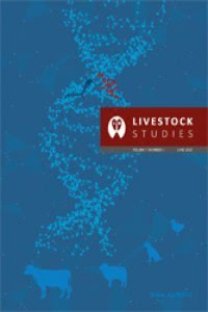LALAHANDA YETİŞTİRİLEN ERBROLARDA DAMIZLIK YUMURTA AĞIRLIĞININ KULUÇKA RANDIMANI VE BESİ GÜCÜNE ETKİSİ
Bu çalışmada, Erbro etlik anaçlarının ana hattı, A22 dişiler ile baba hattı B55 horozların çiftleşmesinden elde edilen hibrit yumurtalar kullanılmıştır. Yumurtalar ağırlıklarına göre 4 gruba ayrılmıştır. 1. grup (55-60 gr.), 2. grup (61-65 gr.), 3. grup (66-70 gr.), 4. grup (71-75 gr.). Gruplara göre ortalama yumurta ağırlıkları sırasıyla 58.10, 63.18, 67.90, 72.44 g dır. Civciv çıkış ağırlık ortalaması gruplara göre sırasıyla 39.40, 42.66, 46.02 ve 49.08 g dır. Besideki hayvanların 5. 6. 7. ve 8. hafta itibariyle tartıları yapılmıştır. Gruplara göre sırasıyle canlı ağırlık ortalaması 5. haftada 1059.3, 1162.9, 1192.8 ve 1193.4 g, 6. haftada 1476.2, 1551.9, 1564.5 ve 1584.0 g, 7. haftada 1843.5, 1920.3, 1985.8 ve 1983.6 g, 8. haftada ise 2186.7, 2225.9, 2279.7 ve 2306.4 g dı r. Yaşama gücü %’ si gruplara göre sırasıyle 8. hafta itibariyle % 95.3 – 90.7 – 98.4 ve 99.2’ dir. Yem tüketimi 8. hafta (56. gün) itibariyle piliç-gün/gr, olarak gruplara göre sırasıyle 119.18 – 125.12 – 115.77 – 116.77’dir. Besi süresince yemden yararlanma ise gruplara göre sırasıyle 3.10 – 3.20 – 2.90 - 2.89 olarak bulunmuştur. Yapılan istatistik analizlerde (1. 4.) ve (1. 3.) gruplararası fark çıkış ve besi süresince önemli bulunmuştur. Sonuç olarak, Erbro hibritleri için 60 gram ve daha ağır yumurtadan çıkan civcivlerin, diğer gruplara kıyasla, yaşama gücünün daha yüksek ve canlı ağırlık kazancının daha iyi olduğu söylenebilir.
The effect of Egg weights on Hatchbility and live weight gain of Erbros chicks in Lalahan
In this study eggs of crossbred Erbro grandmother hens A22 and grandfather cocks B55 were used. Eggs were diveded into 4 groups accading to weight of eggs. The egg weight range of groups 1, 2, 3 and 4 were 55-60, 61-65, 66-70 and 71-75 g. respectively. The avarage weight of eggs for groups 1, 2, 3 and 4 were 58.10, 63.18, 67.90 and 72.44 g. respectively. The obtained number of chicks of group 1 was 130 at the and of hatching period, this guantity was considered as standard and thesame number of chicks of other groups were included into feeding experiments chickswere numbered before feedingtrials. The mean chick weight of groups were 39.40, 42.66, 46.02 and 49.08 gr. respectively. Chicks were weighed after 5, 6, 7 , and 8 wechs The determined avarege chick weight of groups 1, 2, 3 and 4 after 5, 6, 7 and 8 wechs were 1059.3; 1162.9; 1192.8 and 1193.4 g. 1476.2; 1551.9; 1564.5 and 1584.07 g.; 1843.5, 1920, 1985.8 and 1983.6 g. and 2186.7; 2225.9, 2279.7 and 2306.4 respectlvely The percantage living rate and feed consuming rate (chick-day/g.) of groups 1, 2, 3 and at the end of 8 weeks were observed 95.3, 90.7, 98.4 an 99.2/and 119.18, 125.1, 115.77 and 116.77 respectively. During the feeding trials, the efficiency of feed utilization for groups 1, 2, 3 and 4 were 3.10 -3.20 -2.90 and 2.89 respectively. Statistically significnat correlation were found between groups 1 and 4 and groups 1 and 3. In conclusion it may be said that chicks of Erbro hybird obtained from 60 g. or havier eggs were showed higher living rate and much more higher weight gain compare to the other groups.
